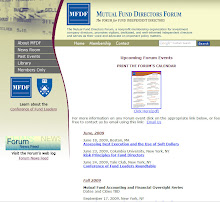Yesterday, Andrew J. Donohue, Director of the SEC's Division of Investment Management, gave the keynote address at a meeting of the National Regulatory Services meeting in Scottsdale, Arizona. The address is notable for several reasons. First, Donohue stressed the importance of compliance, especially during times of financial stress, and urged firms to resist the temptation to downsize compliance and legal staffs to cut costs, because strong compliance and legal teams are even more valuable during times of increased scrutiny and stress like the present:
Donohue also indicated that the Division anticipated proposing amendments to Rule 204-2, regarding books and records, to modernize it and bring it in line with current practices and technology.
Of particular interest to directors, Mr. Donohue discussed his "Director Outreach Initiative" he started in 2007; and he announced that the Division expects to recommend to the Commission that they issue interpretive guidance regarding when directors may delegate certain responsibilities consistent with the valid exercise of their business judgment:
Typically, the biggest expense of a firm is its payroll. Therefore, in a down market, to cut costs the firm may consider laying off employees — including compliance and legal personnel. The notion that a firm should include compliance and legal personnel among the group of employees to downsize can be in my view a serious mistake. This is because compliance and legal areas of responsibility, unlike other aspects of a firm's operations, are generally unrelated to the dollar value of the firm, assets under management, or the firm's revenues. Rather, compliance and legal operations are driven by the complexity of investments, the number of portfolios, and trading activity, not by the value of assets. As such, compliance and legal are necessary core elements for a firm to operate and must continue to function properly whether or not the firm downsizes. If anything, I submit that the value of compliance and legal personnel increases during a down market. This is because in periods of heightened scrutiny, investors, regulators and counterparties may be loath to give a firm the benefit of the doubt if there is any question regarding the firm's compliance with the rules if the firm has decreased its compliance or legal resources.Second, Donohue encouraged the use of technology to assist with compliance monitoring, but warned that computer-based controls are a compliance tool, and are not a substitute for a comprehensive compliance regime:
[J]ust because a firm may use computer filters or other technology to catch potential compliance problems earlier does not shift the responsibility to make sure that a transaction complies with the firm's policies, procedures, and portfolio restrictions. Such responsibility remains where it has always been — on firm management. In my view, compliance should be there to assist management — not supplant it — in complying with this responsibility.Amplifying his point about the value of a strong compliance regime, Mr. Dononue also used two recent cases in which the Commission has brought charges against investment advisers for failure to disclose conflicts of interest, Banc of America and BISYS, as illustrations of situations where a compliance program that included appropriate reviews of conflicts and whether and how such conflicts are identified, disclosed and resolved may have prevented SEC investigation, serious financial penaltes, as well as the associated negative publicity.
Donohue also indicated that the Division anticipated proposing amendments to Rule 204-2, regarding books and records, to modernize it and bring it in line with current practices and technology.
Of particular interest to directors, Mr. Donohue discussed his "Director Outreach Initiative" he started in 2007; and he announced that the Division expects to recommend to the Commission that they issue interpretive guidance regarding when directors may delegate certain responsibilities consistent with the valid exercise of their business judgment:
Since launching this initiative, I have attended more than 25 mutual fund board meetings and have obtained insightdirectly from directors and other industry participants. Based on this feedback, my staff is assembling a variety of recommedations for the Commission's consideration for ways to increase the effectiveness of independent directors. The relevance for this audience is that as part of the staff's recommendations, we plan to recommend that the Commission issue interpretive guidance recognizing situations where independent directors, while maintaining ultimate responsibility for fund oversight, may delegate certain responsibilities consistent with the valid exercise of their business judgment. Although we do not contemplate specifying either the specific responsibilities or to whom they may be delegated, compliance personnel are clearly within the universe of persons directors mentioned that they rely upon. Accordingly, stay tuned for further developments.The full text of Donohue's address to the NRS is available at: http://www.sec.gov/news/speech/2008/spch102908ajd.htm





